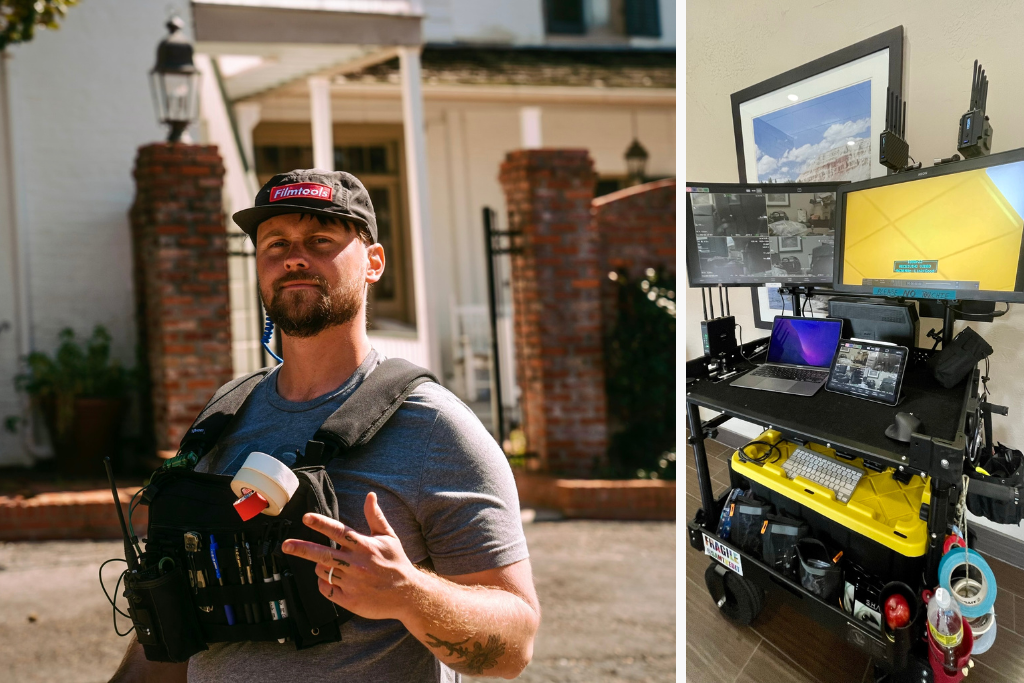
Hello and welcome! First of all, thank you so much for being here. Before we get into the specifics of your set-up, could you give us some background info on how you got your start and some of your past experiences in the industry?
Samuel: Before my journey started in the TV/Film world I was creating social media content for small business and nonprofits. Then one day I realized how burnt out I was getting running my own company and wanted to do something more technical and specialized in the industry. Initially I wasn’t sure what I wanted to do but I had a strong pull towards the camera department. So I closed up shop on my small LLC out of Texas and landed my first gig as a PA/AC/DIT on a reality shoot. For most reading this you’re probably thinking how in the world is that even possible? Well, it’s not and soon after they split the positions up. Luckily for me I was able to move over to AC and DIT after a few weeks primarily due to my background and previous experience. From there I had a couple good mentors who pointed me in the right direction and I started working all over the United States working on average 25-28 days a month. After about a year I started getting offers to cam op and drone op. I did a few gigs as a cam op then quickly realized it wasn’t sustainable for me due to a previous injury that had occurred during my time in the military. At that point I decided the role of a DIT was for me and so I started focusing on that role. Now that I knew what I would be doing for at least the next few years I started consuming every piece of content online to better equip myself as I continued to take on more in depth DIT roles. I watched hours of YouTube videos and even payed for some online courses I found. I really took my career in my own hands and made sure every production I worked I’d be ready and equipped for anything that could happen.
What types of productions do you usually work on? What are the main ways in which they differ from each other?
Samuel: Today I work primarily as a DIT on reality and docu style productions with the occasional add on as a drone op and or AC. I’ve found that most non union reality and docu style productions run a lean crew.
And a follow-up question to that, do you have a favorite type of production to work on?
Samuel: My absolute favorite type of production to work on would be reality. The crews are small, lots of run and gun, plus the vibe of crews tend to be more supportive as you don’t have all the extra positions and union rules. Plus it’s reality so I get to meet a lot of interesting people from all over the world.
Now everyone has different preferences and a different cart/workstation set-up, could you tell me about yours?
Samuel: Currently I’m running an innovative cart for larger productions and on smaller shoots I’ll bring a smaller media management kit that usually finds it’s home on a desk in my hotel room.

For those that may just be starting to build their cart/workstation, or are in the early stages of it, what are some pieces of equipment that you consider absolutely essential?
Samuel: I’ve found that the most important factor in building a kit is a fast media management setup. One production I worked on there were 20 plus cameras ranging from go pros to Sony FX9s. So on any given shoot day I’d be transferring 30-50 cards with multiple backups on location and shuttle drives to be delivered to post. If you’ve transferred that many cards before you know how important it is to have fast and reliable cables, readers, computers, drives and software. The last thing you want happening is a producer to walk up after wrap and tell them something crazy like I’m gonna need another few hours.
Going along with the previous question, do you have any tips for beginners in the field? What’s something you wish you knew when you were first starting out?
Samuel: The two biggest mistakes I see with people breaking into the industry is a lack of drive and curiosity. Often I’m asked “how do I find more work?” And my response is typically have you tried staffmeup or local Facebook groups? The response tends to be “yeah I applied to a job a few months ago and never heard anything back” and then they give up. When I started and even today I’ll find myself applying to jobs all over on a daily basis. Obviously not everyone can travel for whatever their circumstances are but there’s always going to be someone who’s willing and able so that’s your competition. In regards to curiosity it seems that people would rather be the cool kid than ask questions while on set. Seeing that you can learn more working as a PA for a weekend compared to a semester of film school, asking questions is the quickest way to expand your knowledge.

Do you have anything else you’d like to share?
Samuel: Honestly I’ve found my perfect job and don’t plan on doing anything else for the foreseeable future. I’ve had the privilege to meet some incredible people both cast and crew plus I get paid to experience things I probably never would have got the chance to if I wasn’t working in this industry.
Thanks so much Samuel. And be sure and check back each week for another Date Expert Interview!